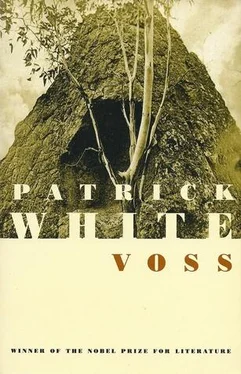The flotsam Turner was fascinated by the idea of friendship with this man. Turner had lived in the streets, and made acquaintances, but the solider stuff of friendship, or the subtle colours of permanence, he had neither known nor coveted. In fact, anything that restricted sudden change had always been undesirable.
Yet, here he was, now grown wistful for the rock.
‘When we return from this here expedition,’ he said, stretching out and crossing his legs, for Turner was never occupied, ‘and have received our bounties and applause, I will get myself rigged out in something real gentlemanly, and come on a pleasure visit, Albert, to this property you was telling us of.’
‘If it is pleasure you are looking for, then you will be coming to the wrong place,’ Judd replied, with evident affection for his property as it stood.
And he held up a needle and squinted to thread it.
‘Oh, it is not feather beds, nor nothink of that description you need worry about,’ Turner hastened to correct. ‘I can doss down as good as any on the floor, in that shed, for instance, where your old woman makes the butter.’
For, through conversation, the place did exist, solidly, naggingly, in Turner’s mind.
These fanciful, though humble plans tended to make Ralph Angus irritable and rather bored, for his own estate was considerable.
‘You would be a square peg, if ever there was,’ said the landowner, who had condescended to wax some thread for the use of Judd.
‘I would not,’ protested Turner. ‘I would learn things.’
In a return to childhood, if necessary. Because dependent, it even seemed the only state desirable. He was carving his name upon the trunks of those dusty she-oaks that grew in a ragged fringe round the shack. Although alone, he was not lonely, for he had remained, as always, within call of his friend.
‘Tell us some more, Albert,’ he said, as they sat in actual person in the cave. ‘Tell us about the time the fire would not be held back, and burned the wool shed.’
‘The wool shed?’ laughed Angus.
‘Yes,’ said Judd, ‘the shed, that is, where I and my boys shear our sheep.’
‘Oh,’ said the rich young man, and showed mercy.
‘Tell us about the fox you brought home, and had on a chain, to tame,’ Turner pursued.
‘That is all,’ said Judd, out of a mouthful of thread. ‘I had it on a chain. I never did tame it.’
‘What did you do, then?’ asked Turner.
‘I shot it.’
‘Go on,’ whispered Turner, and saw the whole incident.
‘It was a sick, mangy thing,’ said Angus, ‘if it was the one I saw at Judd’s.’
Yet, the young landowner had grown to like the lag turned squatter, and sensing this himself, Judd was made melancholy for his captive fox, which had flamed on occasions, he had seen it with his own eyes, at dusk, picketed on the edge of the scrub.
One day, not long after the lamentable incident of the mustard and cress, Voss approached the three men, who were seated together as usual at the fire. Turner and Angus, who were idle, at once began to look intently at the burning sticks, while Judd continued to patch the belly of a canvas water-bag.
‘Mr Judd,’ began Voss, ‘I have intended now for some time that we should take steps to preserve our navigation instruments from the wet.’
He waited.
Then Judd replied, forcing the needle through the canvas:
‘Nothing will preserve our instruments from the wet that they are getting.’
‘How so?’ asked Voss, although it was possible that he knew.
One of his knees was bent forward. It quivered very slightly.
‘They were lost aboard the raft,’ said Judd.
It did hurt him. He could have pricked himself to distract his mind.
‘It is unfortunate,’ said Voss, ‘that you did not employ your instinct on the instruments, instead of upon the flour.’
‘Ah, that flour!’ cried Judd, suffering, as, indeed, was intended. ‘Can you not leave it alone?’
This massive man was trembling.
‘You are very touchy, I fear,’ sighed Voss.
It was not known for certain whether he had achieved his whole purpose.
‘It is a sore point with me, sir,’ said Judd, ‘the instruments.’
There was a hissing of water upon the fire, from one single drop, that fell with the greatest regularity through the rock sleeve, or chimney.
‘There is one compass, sir,’ admitted the man who was again a convict, ‘that I was carrying in my own saddle-bag.’
‘One compass?’ said Voss. ‘That will be an embarrassment if, for any reason, we are compelled to form ourselves into two parties.’
Because the implications were so insidious, nothing more was said, and he returned to that side of the cave, almost a little alcove, which he shared with Le Mesurier.
In Ralph Angus, compassion for the convict began to struggle with the conventions he had been taught to respect. Always conspicuous for his manliness, he did, however, bring himself to say:
‘I must apologize to you, Judd. I mean, for the behaviour of others.’
Guilt experienced for past behaviour of his own stiffened his already wooden words.
‘Huh,’ spat Turner. ‘To form ourselves into two parties. If there is any question of that, we are with you, Albert. With or without compass. Ain’t we, Ralph?’
Angus did not answer. He did not yet know how far he was prepared to go, and was unhappy about it, although from that moment he was drawn closer to Turner and Judd.
The incident did not develop further, or so it seemed. There were other problems, of which Le Mesurier’s illness was not the least. The sick man was recovering slowly, while remaining weak. He had reached the stage where he could sit up again in clothes that appeared too large, the bones of his hands locked together. He had grown very yellow, and the eyes in his hairy, melted face were become quite visionary, as he stared out from the mouth of the cave upon the world of grey water and the sticks of trees.
Now, from time to time, the rain would lift, literally, he felt, of something so permanent and solid. Then, in the stillness, the grey would blur with green. In the middle of the day the body of the drowned earth would appear to float to the surface; islands were breeding; and a black dust of birds, blowing across the sky, seemed to promise salvation.
Voss, for ever observing his patient, was encouraged one day on seeing the latter attempt to hobble.
‘That is right, Frank,’ he said. ‘It is good that you should make efforts, so that you will be fit to push on with me when the wet season is past.
‘You will?’ he added.
As it had never occurred to Le Mesurier that there might be an alternative, he did not ask for explanations, but answered with a flatness that matched the blue-grey water with which the afternoon was filled.
‘Of course.’
He did not look at Voss, however.
There were occasions, this fever-gutted man suspected, when his leader was not sensible of their common doom, and so, he must see for him, he must feel for him. By now he was able to read the faintest tremor of blood or earth, the recording of which was perhaps his sole surviving reason for existence.
*
Exhausted by the first few steps he had taken, he was quick to drop off that night, and Voss, after he had listened long enough to his companion’s breathing, and watched the other shapes of sleep slowly form around him in the cave, decided at last to examine the notebook. This was done quite simply once the conscience had been overcome, for the book was protruding from a saddle-bag, within easy reach, and unprotected by its sleeping owner. Le Mesurier was lying in a state of fretful innocence, in the congested light from a fire as dull and still as dusty garnets.
Читать дальше












